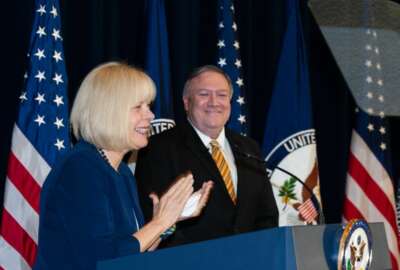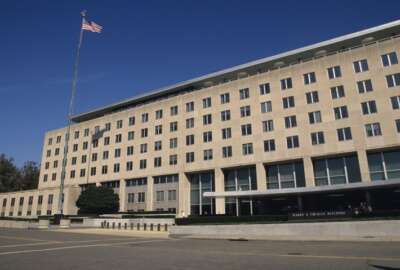![U.S. Secretary of State Michael R. Pompeo shake hands with former Secretary of State Dr. Henry Kissinger at the Department's 230th anniversary celebration at the U.S. Department of State in Washington, D.C., on July 29, 2019. [State Department photo by Ron Przysucha/Public Domain]](https://federalnewsnetwork.com/wp-content/uploads/2019/07/48408035651_e645afdf4f_o-1-400x270.jpg)
Amid pending reorganization efforts, State Dept. launches new training, awards
The State Department sheds more light on training for its new hires, as well as a new employee recognition award.
As the State Department looks to restart some of the reform efforts made under the previous secretary, the agency shed more light on training tweaks for its new hires — as well as a new employee recognition award themed around a new “professional ethos” recently introduced by Secretary Mike Pompeo.
In an address to employees marking the 230th anniversary of the State Department, Foreign Service Institute Director Daniel B. Smith said the agency will pilot its new “One Team” training program at the end of August.
Calling it an “important departure from the past,” Smith told employees that the new course will train civil and Foreign Service hires alongside new political appointees, and will supplement existing workforce training.
This fall and winter, the agency will run a few pilots of the new training program before finalizing the curriculum. Smith also told employees that the agency is looking at ways to including in the training locally employed staff and contractors at embassies and overseas posts.
Carol Perez, the State Department’s top HR official and director of the Foreign Service, said employees will start in November as part of its new “One Team” award.
Related Stories
“At its core, the award seeks to distinguish an individual who exemplifies the department’s professional ethos [and] acts as a true champion of American diplomacy and servant of the American people. This is someone whose professionalism, integrity, responsibility and leadership have enabled teamwork and results,” Perez told employees.
But while State Department current leadership looks to re-energize staff and recruit the next generation of employees, management vacancies and turnover have stalled some of the agency’s reorganization efforts.
When Pompeo began his tenure at the State Department in April 2018, senior agency officials told the Government Accountability Office that his top priorities included ending the hiring freeze and ramping up recruitment efforts.
One senior State official told GAO that critical gaps in key positions and a shortage of rank-and-file State employees, if they persisted, could have led to “cataclysmic failure” at the agency.
But other department-wide shakeups that began under former Secretary Rex Tillerson remain on pause, or have been scrapped altogether.
Pompeo, according to GAO, found existing reform projects were “not well designed” when he first came into the agency, and wanted a greater emphasis on cybersecurity and data analytics.
As a result, the agency disbanded its reorganization management team and delegated its remaining projects to bureau leadership.
State Depart. reform efforts remain work in progress
But agency officials told auditors it still remains unclear whether some projects remain a priority in the secretary’s office, or whether they’ve hit a dead end.
Some of the officials tasked with keeping reform plans going told GAO they’ve “received little or no direction” or any “indication of continued interest” about their projects since Pompeo took office.
State Department officials told GAO that some efforts, such as a plan to merge the State Department and Agency for International Development’s real property offices together, will not move forward.
Vacancies in key leadership positions have also kept most reorganization efforts from moving forward. According to GAO, Deputy Secretary of State John Sullivan told auditors last November that the lack of a permanent undersecretary for management in the first year-and-half of the Trump administration was “hindering State’s ability to conduct business and implement reforms.”
The undersecretary of management position, in many cases, served as a central hub for approving the reform projects. Offices leading the work for 12 of State’s 13 reform projects, for example, report directly to the undersecretary for management.
The Senate in May confirmed former Central Intelligence Agency Chief Operating Officer Brian Bulatao to serve as President Donald Trump’s permanent pick for the role, but more than a dozen reform efforts remain a work in progress.
Pending agency reforms include improvements to the agency’s human resources, information technology and data analytics capabilities.
Acting State Department Comptroller Jeffrey Mounts told GAO the agency will review its list of reorganization efforts and will let the Office of Management and Budget know which projects it will continue to implement.
Copyright © 2025 Federal News Network. All rights reserved. This website is not intended for users located within the European Economic Area.
Jory Heckman is a reporter at Federal News Network covering U.S. Postal Service, IRS, big data and technology issues.
Follow @jheckmanWFED





